Wi-Fi in law
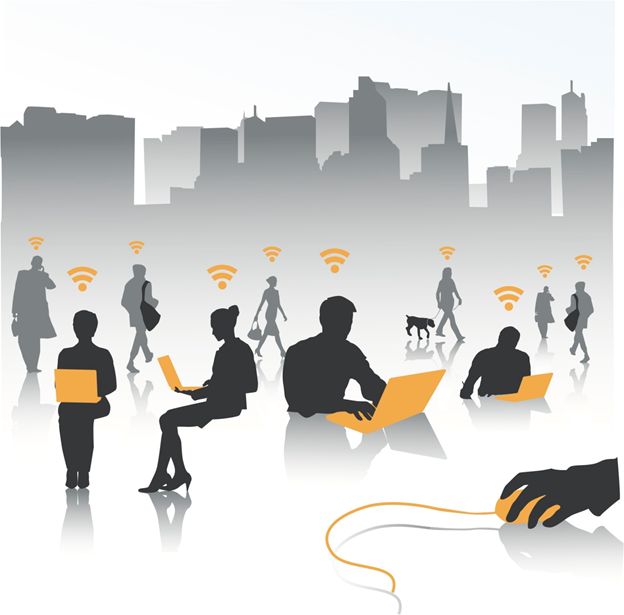
In accordance with the legislation of the Russian Federation, since 2014, all public Wi-Fi access points are required to identify users. The law covers owners of public Internet access networks, such as restaurants and cafes, shopping centers, hotels, car dealerships and others. In this article we will try to figure out how it all works today and consider the different methods of authentication.
According to the so-called anti-terrorism amendment in the Law on Communication ( No. 97-FZ ), only those who have undergone this procedure are allowed on the Internet. The RF Government Decree No. 758 and No. 801 of 2014 was intended to “authorize users using a passport or other identity documents”.
In fact, everything turned out to be easier. Alternative authorization methods were given a way to life - by using a login on the website of state services or a mobile phone number. At the same time, the owner of the public access point is also obliged to keep user logs for half a year. After this resolution, numerous previously opened Wi-Fi networks in cafes, restaurants, train stations, subways, shopping centers and airports were equipped with identification and authorization systems (i.e., user identification).
Usually the connection and authorization process is as follows:
')
- Wi-Fi network is selected in the device settings;
- The user receives a push-notification of the connection (in Android OS) or an automatic redirection to the portal (in iOS);
- Registration is in progress. At this stage, you need to enter the phone number to which the SMS will come to access Wi-Fi (login and password). In some cases, it is determined automatically, and this step is skipped.
The call identification procedure is similar. To access the Wi-Fi is invited to dial a toll-free number or wait for the call and answer it. Both options provide fast Wi-Fi authorization.
In 2015, the Ministry of Communications planned amendments to the legislation providing for fines for those who did not provide identification of users on their public Wi-Fi network. For individual entrepreneurs - up to 50 thousand rubles, for legal entities - up to 200 thousand rubles. However, the regulation was not adopted.
THE REMINDER OF THE ROSCOMNADZORHowever, the owners of Wi-Fi access points in public places are mostly observing the law: in the first half of 2017, Roskomnadzor found violations related to the lack of identification only in 10% of cases. According to TMT Consulting, in 2016 there were more than 80 thousand public Wi-Fi access points. By the end of 2017, there were more than 96,000 such access points in Russia.
on the organization of the access point using Wi-Fi technology in public places.
In accordance with Part 1 of Art. 14 of the Federal Law of 29.12.2010 No. 436- “On protection of children from information harmful to their health and development” access to information distributed through the Internet, in places accessible to children, is provided by the person organizing access to the network “The Internet” in such places, to other persons, subject to the application of administrative and organizational measures, technical, software and hardware means of protecting children from information harmful to their health and (or) development.
Failure to perform this duty entails the responsibility established by Part 2 of Art. 6.17 of the Code on Administrative Offenses of the Russian Federation, which extends to all subjects, with the exception of communication operators providing communication services on the basis of contracts for the provision of communication services concluded in writing.
The amount of the penalty for providing access to Wi-Fi without authorization is:
- for officials - from 5 to 10 thousand rubles;
- for legal entities - from 100 to 200 thousand rubles.
If a citizen violates the rules repeatedly, then the size of the fine for access to Wi-Fi without identification will already be about 300 thousand rubles. After several warnings, law enforcement agencies have the right to disqualify and remove the offender from its activities for a period of up to 3 years.
Authentication Services
Naturally, all this concerns not private users with Wi-Fi routers who deploy a wireless network at home, but legal entities and individual entrepreneurs. However, they are not obliged to independently identify users connecting to public access points to the Internet. For this there are quite a few commercial services that provide their services to owners of public networks.
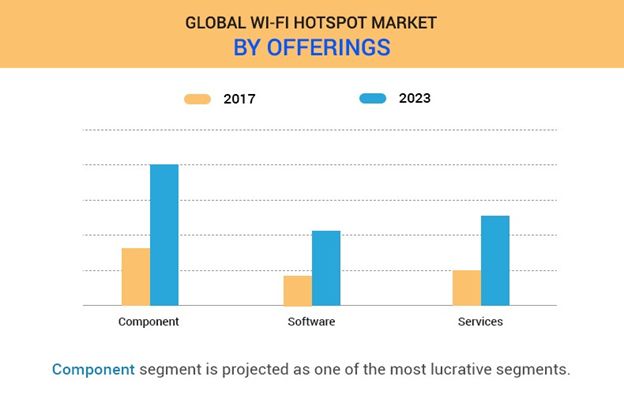
According to the forecast of Allied Market Research, by 2023, the global market for Wi-Fi hotspots will grow to 5.198 billion dollars, and the average annual growth will be 16.9%. The largest segment is hardware (components), followed by services and software.
These services allow you to configure the identification of Wi-Fi users in different ways: send passwords by SMS message, perform authorization through social networks or via ESIA (Unified Identification and Authorization System), if the operator has the necessary licenses. SMS is a standard scheme. When trying to connect to the network, the visitor is offered to enter his number, to which a code is received in an SMS message.
Many services have the ability to set various restrictions: on the Internet speed, access from certain devices, etc. Such services differ not only in the cost of services, but also in connection features. For example, it may be a cloud service or software configuration on the customer’s equipment.
Thus, the public Wi-Fi user identification service called Call-ID to connect to Wi-Fi will redirect them to the authorization page. Call-ID identifies through a free call to the user's phone number of the operator. As a result, a unique access code is generated.
This service is connected on the Call-ID equipment (this is a complete set of equipment with the operator’s firmware and control of parameters in 24/7 mode) or on the client’s equipment (hot-spot owner). The latter can increase customer loyalty by providing Wi-Fi from the institution and display its advertising pages when users access the Internet. CaI service offers identification of Wi-Fi users via SMS, voice or Flash message, phone call, social networks or ESIA.
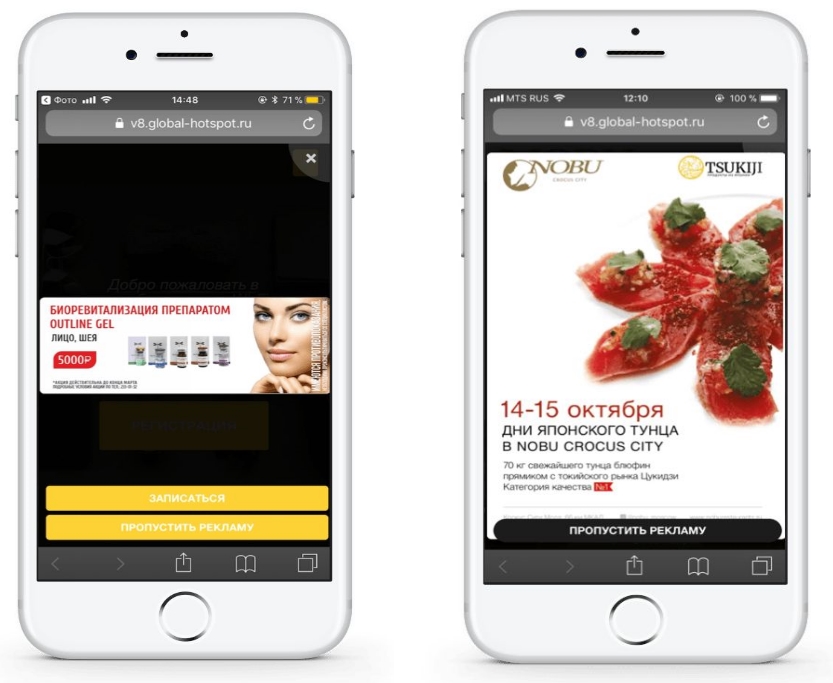
Global Hotspot portal provides authorization services in public hot spots. It provides a variety of options for cooperation on advertising content, allows you to display ads with reference to the location of the visitor, customize it based on the analysis of data from surveys by age, gender or interest.
Netams' WNAM authorization system stores all information only on the customer’s server and supports all types of identification (SMS, call, ESIA, account in the Windows domain). Another authorization system Wi-Fi System also offers a choice of a large number of identification schemes. And SMS + SOCIAL uses two-factor authentication: by SMS and through social networks. Facebook, Instagram, Twitter, Odnoklassniki and VKontakte are supported.
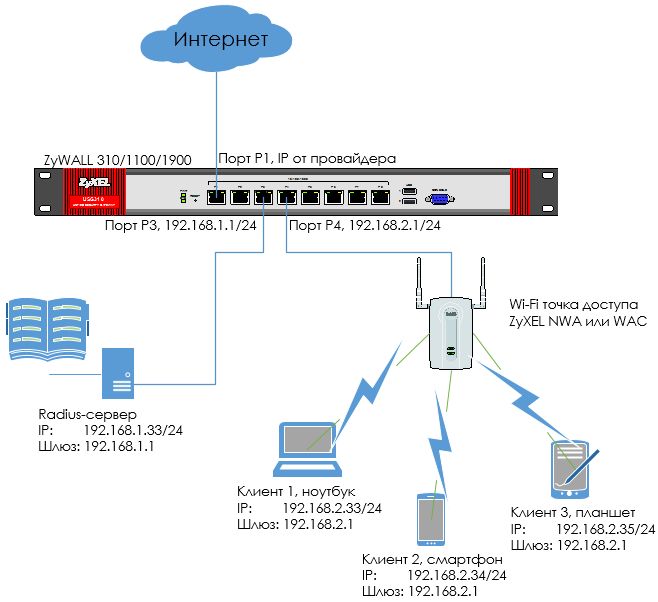
ZyWALL / USG Zyxel devices can be configured to authorize clients on an external RADIUS server. In this example, the first LAN1 network is used to connect an external RADIUS server, LAN2 - to connect clients via Wi-Fi. To do this, one or more Zyxel NWA or WAC series access points are connected to the P4 port.
For example, for user authentication / authorization, you can use the ZyWALL 110 firewall with any service that works with the Radius server and the Captive Portal (for example, CAI-WiFi ). If you configure ZyWALL / USG to authorize clients via a web page on an external RADIUS server, then users connecting via Wi-Fi will be prompted to enter their login and password when they try to open any web page, and further admission will occur only successful authorization.
From free for visitors Wi-Fi you can get an additional benefit. So, the Hot Wifi service allows you to provide guests with free Wi-Fi, but with the condition of subscribing to a page on Facebook, VK, Twitter, Instagram, or placing a recommendation post. When you try to connect, the user sees a proposal to log in through one of these social networks. The owner of the access point (special router), receives information about their customers and promotion in social networks.
As a rule, authorization through such services occurs in a couple of clicks. After that, the user's device is registered on the network. Re-registration is not required. Companies that provide such services earn money from the owner of the access point (800-1000 rubles per month) and share advertising revenues with them.
The demand for installation of access points is also growing on the part of corporate customers. Identification services are also being developed for them. For example, the federal telecom operator Dom.ru Business brought Wi-Fi PRO to the market - a system for managing client Wi-Fi access with enhanced functionality for setting up an authorization portal, a list of marketing tools and communication with clients. By connecting Wi-Fi PRO, the client can control access and various ways to identify / authorize users, restrict access to the Wi-Fi network, limit sessions by time of use, and also specify the fields that are required to be filled in during registration.
Unified authorization system
Recently, a new idea appeared: connect Wi-Fi networks in Russia to a single authorization system. A proposal to create a unified system for identifying users of public Wi-Fi networks may be included in the program for the development of the Russian digital economy.
Technical design and development of such a system is scheduled to begin in July 2018 under the leadership of the Ministry of Communications and Mass Media. The system will need to identify and authorize the user, and then provide access to the network.
It is also planned to adopt amendments to the legislation: they will create the legal basis for the deployment and application of this system. These works will be completed in the technical and legislative part in June 2019.
Reportedly, the system will be integrated with the state Unified Identification and Authorization System (ESIA), which contains data on 50 million registered Russian citizens. To pass the identification, you will need to enter a mobile phone number and receive confirmation by SMS or ESIA login / password. Rostelecom can become a single operator for authorizing users on Wi-Fi networks.
For law enforcement, storage in a single database of users of public Wi-Fi networks is much more convenient. Users are also comfortable: no need to be re-identified. Theoretically, any public Wi-Fi access point will know already somewhere that has passed the identification of the user of the wireless device. True, solutions for identifying users of Wi-Fi networks using a mobile phone number have one flaw: the number can be issued to a completely different person.
The motive for creating a unified system may be security interests, but this is bad news for operators: identification systems have become a source of income for them. These small earnings, they may lose.
By the way, MaksimaTelecom, which built Wi-Fi networks in the Moscow and St. Petersburg metro, already has its own Wi-Fi subscriber identification system, which is already integrated with ESIA and into the MT_FREE network in both cities.
Cover all
The growth of the market is supported by the installation of Wi-Fi in public transport and municipal order. So, Megafon has completed the equipment of access points of the Moscow land transport. Free Wi-Fi covered parks in the suburbs.
According to the website m24.ru, city Wi-Fi is already available on 200 streets in the center of the capital and in 24 city parks. To catch the signal, it is enough to be within a radius of 50 meters from the router. Up to 15 thousand devices can work on the network at the same time. After installing 2000 access points in the center of Moscow, Wi-Fi will cover 99% of the capital within the Garden Ring. Increasingly, public free access points are being organized by administrations of other Russian cities.
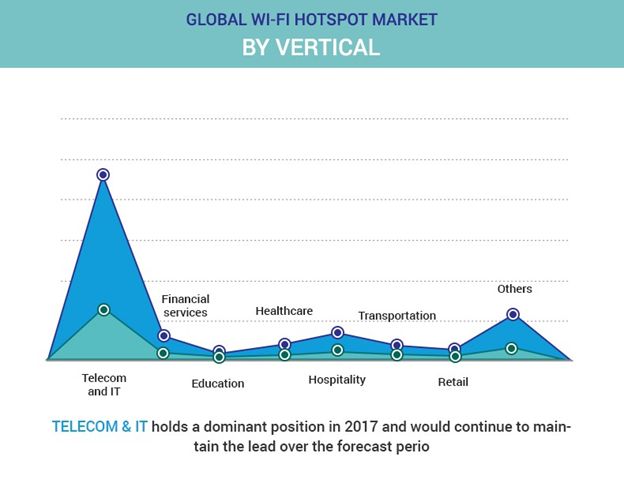
According to the forecast of Allied Market Research, by 2023, in the global Wi-Fi hotspot market, as in 2017, IT / Telecom will lead the industry, outpacing the education, hospitality and retail sectors.
Cafes, shopping centers, hotels are increasingly interested in Wi-Fi - this is an important tool for maintaining loyalty and attracting new customers, especially as the number of mobile devices connected to the Internet is steadily growing in Russia.
Smartphones account for more than half of mobile phones sold in Russia. Users download monthly terabytes of information via Wi-Fi — these are movies, videos, books, music, images, and web pages.
According to TMT Consulting, the revenue of Russian operators from Wi-Fi related services in 2017 reached 3.64 billion rubles, an increase of 23% compared to last year.
Free Wi-Fi is not yet considered a mandatory rule of good tone in public places (cafes, restaurants, fitness clubs, hotels). Therefore, the owner of such an institution can benefit from this service.
Source: https://habr.com/ru/post/349992/
All Articles